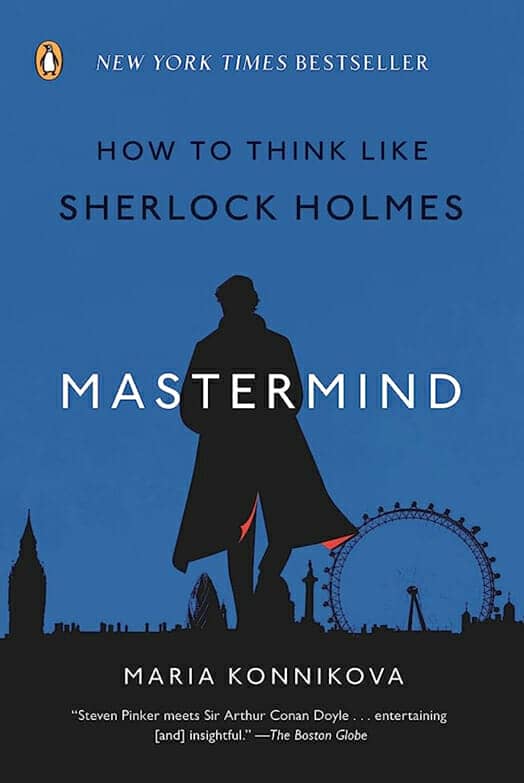 Can you really learn how to think like Sherlock Holmes?
Can you really learn how to think like Sherlock Holmes?
I find the question fascinating. Not merely because I’ve been teaching memory techniques for over a decade.
And not only because I used to give a university lecture about whether or not fictional characters are “real.”
I find the question fascinating because it raises questions about why and how we create divisions between science and imagination.
The question reveals all kinds of silly prejudices that reveal how many of us aren’t reaching our potential.
Yet, by making a few simple shifts, we can do better.
Or can we?
That’s a central question in Maria Konnikova’s book, Mastermind: How to Think Like Sherlock Holmes.
Let’s answer the question thoroughly and look at critical thinking, memory and what it really means when Sherlock says, “Strange how the brain controls the brain!”
How to Think Like Sherlock Holmes According to the Book Mastermind
Have a look at the feature image for this post:
It features people sitting at a bus stop dressed like the Incredible Hulk, Elvis, probably James Bond and Sherlock Holmes.
Is cosplaying Sherlock going to help you think like him?
Probably not.
Instead, Konnikova suggests that you bring together synthesis and creation.
This means that you not only read the Sherlock Holmes stories. You try to “reverse engineer” what they’re saying about critical thinking itself. Then you take action to experience certain outcomes, ideally by completing a specific learning cycle.
To a certain extent, you are creating the character by reading about him, but taking action is the key to experiencing Sherlock Holmes’ thinking.
Can You Think Like A Fictional Character?
Back when I taught film studies, I used to give an entire course on novel-to-film adaptations.
One scholar I used to talk about is named Takashi Tagisawa. In a compelling article called “Against Creationism in Fiction,” he points out that a character like Sherlock is never actually created. He’s based on elements of reality that already exist.
It’s the same thing with Batman in a long chain of associations going back to Oedipus, which is arguably one of the first recorded detective stories.
In a critical thinking example I’ve never forgotten, Tagisawa asks a simple question related to the chain of associations. If a fictional character is created, what are the conditions under which that character would be destroyed?
Hard to answer, isn’t it?
That’s like asking, how would we destroy deductive or inductive thinking? It’s not really possible because these things were not created as such. They evolved. And the entire detective genre draws upon a combination of actual detection and everything from the Bible to Edgar Allan Poe and beyond.
That said, a specific character does cease to “exist” at some level if no one reads about that character anymore. This is what Konnikova means by creation and synthesis. We need to animate the ideas at the core of the character through study and practice.
Solving Sherlock’s Riddle
In more scientific terms, we might think about the power of mental imagery. I suggest this because when Sherlock remarks that the “brain controls the brain,” he’s right.
Studies of mental imagery show that when multi-sensory ideas arise in the mind, our bodies act on them.
So the more you read about Sherlock and supplement your knowledge with reading on topics like developing your personal genius, the more your mental imagery will drive you to act in ways that help you think and remember like Sherlock Holmes.
How Does Sherlock Holmes Remember So Much?
A fair amount of How to Think Like Sherlock Holmes focuses on the “Brain Attic.” That’s a term that basically translates to Memory Palace.
Konnikova then goes through the same basic principles of using this mnemonic device described thousands of years ago in Rhetorica Ad Herennium.
Of course, these ancient memory techniques are even older than that, but it’s interesting how the pattern repeatedly shows up in the same ways throughout history.
Konnikova does a good job of going through many scientific implications of using memory techniques like the Brain Attic. She details:
- The science of memory
- Why people experience doubt when using the techniques
- Performance studies that make it easier for people to get results
- Different aspects of observation you can use
- The role of meditation for better memory and mental acuity
- Visualization, creativity and the importance of play
But will this book help you become a mnemonist?
Let’s look at that question next.
Is Mastermind: How to Think Like Sherlock Holmes Worth Buying?
Personally, I think all books that touch upon memory improvement are worth reading.
Mastermind is a lot like Moonwalking with Einstein, but with less story and more science reporting.
And Maria Konnikova is a great writer with experience in a lot of fields related to top-notch performance in areas that require deliberate practice.
However, for all of the discussion, it’s surprisingly thin on memory strategies. And that’s where our central question about the existence of Sherlock Holmes comes into play.
He did not exist, and therefore neither thought nor used memory techniques. Even my friend Ben Cardall, who is often (deservedly) styled as a real life Sherlock Holmes, agrees this is a problem.
For that reason, I suggest that Mastermind is best read in combination with other, meatier critical thinking books. It is not a guide with specific action steps and ultimately I feel that it overblows the genius of the fictional character.
That said, it has many excellent references, both to critical thinking quotes in the Holmes lore and many scientific studies and other popular journalism sources.
The book is also a nice example of doing half of what Konnikova describes: imagining what Sherlock does. The books is filled with questions like:
How does he do this?
… followed by speculative answers.
One of the things that makes something like Moonwalking with Einstein better for people who want better memory is that Joshua Foer actually synthesizes the techniques. But to be fair, Konnikova does more synthesis in books that came out after Mastermind.
All the more reason to read this one as part of a stack of research you do on rational thinking and memory.
How To Be Like Sherlock Holmes…
At the end of the day, I cannot resolve the paradox. That’s because it’s partly what some people call a “pseudo question.”
Chomsky defines this as a question for which there is no answer, and there is a lot to be gained by using our Sherlock-like powers to recognize them and weed them out.
So although I think being like Sherlock is a false premise, I agree with the core premise that we need to imagine (or create) mental representations that enable us to take action. And we must synthesize our ideas about what other top achievers are like so that our mental imagery can help achieve certain goals.
Sherlock, like Batman and the Incredible Hulk and many other figures is both myth and symbol based on truths about the human experience.
But let’s face it:
Trying to be like anyone else is pretty much a trap, fictional or otherwise. Konnikova’s book ends on the biggest point of all, which is Sherlock’s astonishment that the brain controls the brain.
So the real question is why are we outward focused and imitative of others? Why aren’t we using concentration meditation exercises more in the service of discovering what our conscious is like in the absence of categorization.
Much more could have been done to highlight this central question because scientific studies about what people do when participating in a study is well-known as an issue. Participating in studies triggers all kinds of memory biases, for example.
In The Victorious Mind, I try to solve the free will issue, and my own bias is that the in-depth questions we need to discuss usually cannot be addressed in mass market publications.
The title of Mastermind promises the fulfillment of a particular fantasy that is built on sand that is seductive because of the truth of paracosms from which it is built. (That’s a scientific word for imaginary friends and other fantasy worlds we populate with fictional characters.)
Does This Book “Dumb Down” Sherlock”
Yes and no. I like that the book is heavy on the scientific references.
But I imagine that Sherlock himself would have wanted more, including a set-by-step checklist for using the Brain Attic at Sherlock-levels of skill… even in his retirement.
By all means, I think this book is a great springboard to other books and unusual memory exercises.
I agree that Sherlock might be pictured as a person who takes no thought for granted, but I’m not sure that’s a realistic outcome given that humans don’t have the control we think we do.
So my hat is off to Konnikova for a compelling book that has certainly led me to reading and thinking more as part of a longer journey into the realms of mind and memory.
If you’d like to join me, please consider signing up for my free course and more as I share the journey with you:
It will help you not only remember more, but think more critically.
In a healthy way of course.
A human way that can both enjoy our human attraction to myth and symbol, and recognize their limits.
Related Posts
- Can You Really Improve Memory Like Sherlock Holmes? [Actionable 11 Point Checklist]
Lots of people want to improve memory like Sherlock Holmes. But what if there was…
- How To Create And Use Your Own Sherlock Holmes Mind Palace
You can easily master the Sherlock Holmes Mind Palace. Follow the 5 steps in this…
- How Jessie Villalobos Got A Promotion - Magnetic Memory Method Review
Looking for an extensive Magnetic Memory Method review? Listen to Jesse Villalobos show you how…










